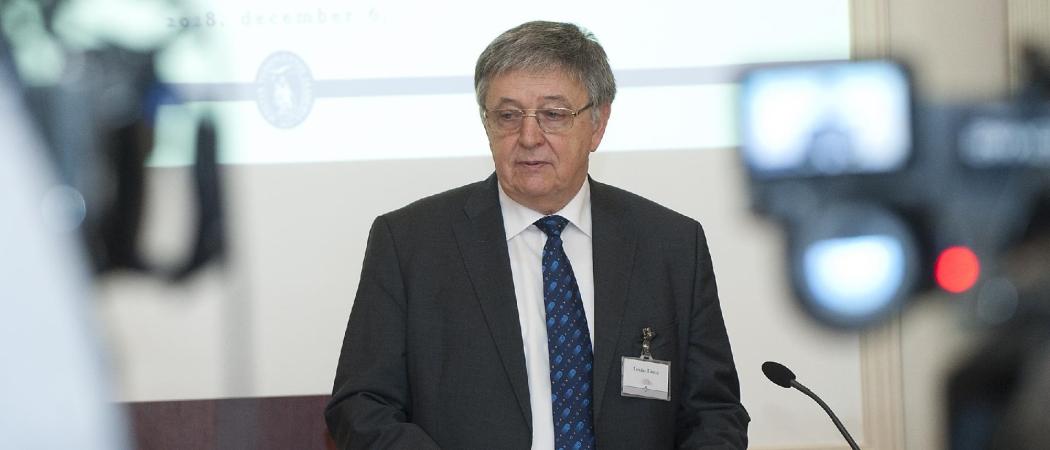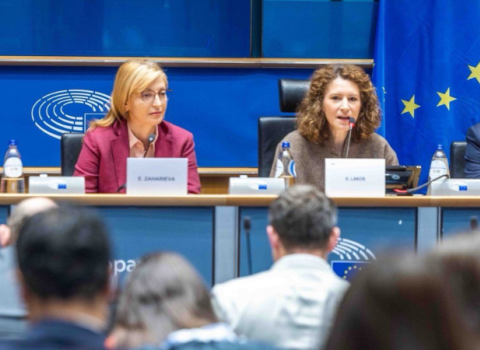The Academy of Sciences battles research minister over control of research funding

László Lovász, president of the Hungarian Academy of Sciences. Photo: mta.hu/Tamás Szigeti
The Hungarian government is continuing its crackdown on academic freedom and has intensified attempts to put the research institutes of the Academy of Sciences under direct political control, after previously forcing the Central European University to move most of its courses from Budapest to Vienna and banning institutions in the country from offering gender studies degrees.
Researchers at the academy are worried about their future, as the government is seeking more control over the research budget and is claiming the academy’s network of research institutes needs to be restructured to boost excellence in research and innovation. The government is also insistent that applied research should take precedence over disciplines in the social sciences and says funding for innovation and research should be separated.
At the academy’s general assembly in December, its president László Lovász said he would agree to a restructuring of the institutes if the government did a full evaluation of the entire research and innovation system in Hungary, that is not limited solely to the academy.
“Based on the results of this audit, we are ready to make the necessary structural changes,” said Lovász.
However, last week, research and innovation minister László Palkovics sidestepped Lovász and met directly with the heads of the academy’s research institutes and “requested” their cooperation in making Hungary’s research and innovation system more efficient. For now, the institutes’ directors are sticking with Lovász and still agree the audit should be independent, and should work to terms of reference that they unanimously agree.
Academics outside Hungary suspect the evaluation is a disguise for the government to take illegitimate action that would limit the freedom of researchers and force the institutes to stay out of topics that are counter to government policies, such as gender studies or migration policy.
“We all have a suspicion that behind all these measures there is political will to weaken science,” says Antonio Loprieno, president of the European Federation of Academies of Sciences and Humanities (ALLEA). “It will be important to keep the distinction between the legitimate and understandable concerns - and the pretexts,” he said.
Róza Vajda, junior research fellow at the department for Methodology and History of Research in the academy told Science|Business that the government, through its ministry for research and innovation, is trying to meddle in “financial and organisational aspects” of the research institutes.
Her colleagues at the Institute for Sociology “are deeply concerned” by government plans, says Vajda. “No one is sure how long they will have a job.”
In a letter to the academy, Palkovics dismissed any criticism and claimed that the row between the academy and the government is solely a matter of finding the best structure and financing principles for the Hungarian research and innovation system. The government “guarantees” the salaries of everyone employed in the Academy’s research institutes “until the new structure and financing model is started,” Palkovics said.
Researchers are concerned
Despite these assurances, the row between the academy and the government has left researchers worried about the future of their jobs, as they can no longer be certain that their research institutes will continue to be funded after the audit. At the moment, “all savings are kept to ensure salaries are being paid,” says Vajda.
In addition, internal discussions regarding their future have put a strain on researchers’ time and energy. The audit proposed by the government means researchers have time-consuming administration to worry about. “This reminds me of the government's campaign against NGOs, which involved loading them with a lot of administrative duties to consume their energy and divert them from dealing with their actual work,” Vajda says.
Social scientists like Vajda are the most exposed to the whims of the government. She is working in a research archive collecting materials for sociological research, but in the wake of the conflict, budgets have tightened and her contract has not yet been renewed. “I cannot see beyond the end of May, when my contract is terminated.”
“I have been used to working on fixed term contracts, as I could be sure about being able to finish my projects that usually lasted several years, and hopefully get hired on another one. Now it is all different,” she says.
The academy has come forward with a proposal that outlines the conditions under which it can reach an agreement with the government. This calls for basic research to have a stable source of funding and for directors of research institutes to have full autonomy to decide which research groups receive funding.
The academy argues it should be allowed to keep funding social sciences, which it says, “is essential to preserving our national identity and protecting our values and interests.”
In a statement the academy said, “We need to empower those in applied research and corporate innovation, while preserving our capacities in basic research and allowing for an easy transfer and transition among these research areas.”
Until the evaluation of the academy’s institutes is complete, the government should be given the benefit of the doubt, says Loprieno. But if the result of the audit shows the worst performing institutes are in disciplines not liked by the right wing government, “That would be a sign that there is something fishy,” he said.
The academy is the dominant research organisation in the country – both funding and conducting research at the country’s universities. It dates to 1825, and employs roughly 5,000 people, of which 3,000 are researchers.
A history of the clash
Until last year, the academy was allocated an independent budget, but new rules would see all public funding for research allocated through the Ministry of Innovation and Technology, led by Laszlo Palkovics.
The ministry will directly manage HUF 29.1 billion (€1 = HUF 318) in support of higher education institutions for research and development, HUF 12.7 billion for the National Scientific Research Fund and HUF 28.1 billion for the Hungarian Academy of Sciences.
The government said the changes will allow the ministry to oversee the use of national funds for research “as efficiently as possible” and to prioritise research areas that make “the best use of resources.”
Last year, the changes were preceded by a smear campaign against researchers at the academy. An article published by Hungarian pro-government magazine Figyelo, entitled, “Immigration, homosexual rights and gender science – these topics occupy the researchers of the academy”, claimed the research topics of the Centre for Social Sciences of the Hungarian Academy of Sciences are politically suspicious, and that the government should have a “greater insight” into the academy’s work.
The smear campaign quickly spread across social media in Hungary, with pro-government media outlets arguing that researchers should not meddle in government policies and labelling the Academy, “a nest for leftist liberals”.
“Attacking the academy has become chic,” Lovász told academy members in December, whilst reminding them they still have the right, and also the obligation, to publish scientific results that are of public interest or have an impact on public policies.
Moot EU sanctions
European academics have previously decried the EU’s inaction in the face of sustained efforts by the Hungarian government to limit academic freedom, as the threat of EU sanctions has not contained right wing politicians in Budapest.
Last year, the European Parliament voted to pursue action against Hungary, following the publication of a damning report from Dutch Green MEP, Judith Sargentini, outlining concerns about threats to academic freedom and the rule of law in Hungary.
Last week, the European Parliament passed another piece of legislation that would allow the EU to cut funding to countries where the rule of law and the independence of the judiciary are limited. According to German MEP Sven Giegold, shadow rapporteur of the new legislation, the EU will be able to cut funding to member states that fail to protect all European core values, including academic freedom.
“All fundamental rights are subject to the controls. This would exactly benefit such cases as in Hungary,” says Giegold.
But the parliament’s mandate ends this spring and with new elections coming up, there is a risk that more Eurosceptics will fill the seats in Brussels and could overturn the legislation. Still, Giegold is feeling optimistic that the position of the parliament will not change after the elections. “The new parliament will still have a pro-European majority,” he says.
However, to date EU institutions have been seen to be a step behind member states that stomp on fundamental rights.
In December 2017, the European Commission referred Hungary’s higher education law to the European Court of Justice on the grounds that it restricted universities in their operations, which is against EU law. Although the case was referred more than a year ago, the court has yet to meet and discuss the case. While waiting for the court ruling, Central European University was forced to move 80 per cent of its degree programmes to Vienna.





 A unique international forum for public research organisations and companies to connect their external engagement with strategic interests around their R&D system.
A unique international forum for public research organisations and companies to connect their external engagement with strategic interests around their R&D system.